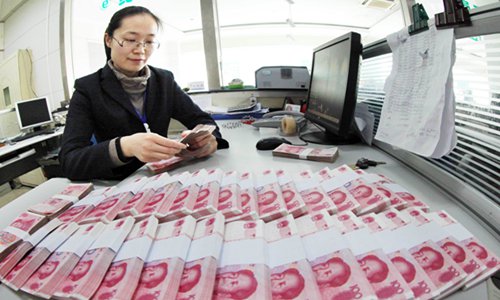HOME >> BUSINESS
Wobbly road for yuan internationalization: analysts
By Chu Daye Source:Global Times Published: 2019/7/7 20:18:40
Trade war with US affects investors’ view of currency’s direction

A woman counts yuan at a Chinese bank. Photo: IC
The road to the internationalization of the yuan, or renminbi, took some detours in 2018, according to a report released by the Renmin University of China on Saturday.
The renminbi internationalization index (RII), an indicator used by the report, stood at 2.95 for the full year, down from a high of 4.91 in the second quarter of 2018 when the yuan surpassed the British pound to become the third most active currency in the world, the 2019 edition of the report showed.
A higher reading indicates greater use of the yuan globally.
The index slid toward the year's end and as of the end of the first quarter of 2019, the yuan was the fifth most active international currency after the US dollar, the euro, the yen and the pound.
The reading shows that the internationalization of the Chinese currency has proceeded in a less steady manner amid the China-US trade war.
The trade war has fueled expectations for the yuan to depreciate, which is seen as a negative factor for the currency's global drive as its expansion needs a stable exchange rate, Liu Xuezhi, an economist at the research center under the Bank of Communications, told the Global Times on Sunday.
Since 2009, the RII increased 150 times from its 2009 level.
"There are hiccups in what is a generally stable expansion process. The Trade war had some negative impact on the process," Liu said.
Since the middle of 2018, the yuan's value against the US dollar has generally trended downward. It was traded at nearly 7 yuan per US dollar at the end of the year.
Xi Junyang, a professor at the Shanghai University of Finance and Economics, told the Global Times on Saturday that the pace of the yuan internationalization slowed in 2018, due to external factors and greater scrutiny imposed by regulators over cross-border capital flows.
In the long term, the expansion of the use of the yuan will need to shift toward third-party use from the current situation in which the yuan is mostly used between China and its trading and investment partners.
"Financial assets that are denominated in yuan and bilateral contracts to be settled in yuan are also drivers for the currency's global use," Xi said.
The report said that to boost the yuan's internationalization, China needs to deepen reforms in the money, bond, stock and foreign exchange markets.
Whether non-residents are willing to use and hold the yuan, and the scale at which they do so, will decide whether China could have a currency in line with its economic size and its status as the world's leading trading nation, the report said.
Xiao Gang, former head of the China Securities Regulatory Commission, said at a forum over the weekend that the opening-up of the Chinese stock market should go hand in hand with foreign exchange and banking interests market reforms.
According to a SWIFT report released on June 5, the rise of Chinese influence is strengthening yuan demand.
For instance, Africa's adoption of the yuan appears to be increasing with the amount of yuan used in the first quarter of 2019 rising 53.48 percent from the first quarter of 2016.
Newspaper headline: Wobbly road for yuan internationalization
Posted in: ECONOMY,BIZ FOCUS